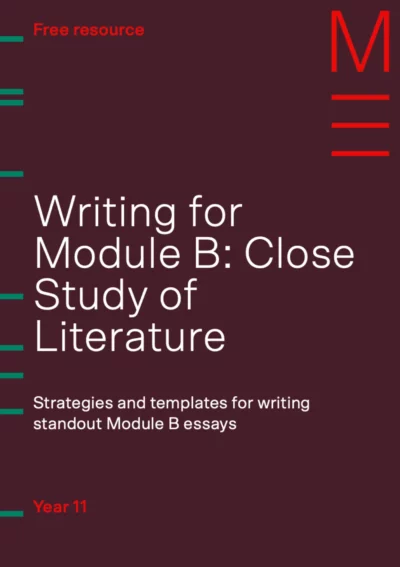Welcome to Matrix Education
To ensure we are showing you the most relevant content, please select your location below.
Select a year to see courses
Learn online or on-campus during the term or school holidays
Learn online or on-campus during the term or school holidays
Learn online or on-campus during the term or school holidays
Learn online or on-campus during the term or school holidays
Learn online or on-campus during the term or school holidays
Learn online or on-campus during the term or school holidays
Learn online or on-campus during the term or school holidays
Get HSC Trial exam ready in just a week
Get HSC exam ready in just a week
Select a year to see available courses
Science guides to help you get ahead
Science guides to help you get ahead

The Year 12 Module B: Critical Study of Literature is considered the most difficult module in the HSC Advanced English course, and with good reason. You need a deep understanding of your text and the ideas it represents! In this post, we’ll break down the Module B: Critical Study of Literature syllabus so you can ace your critical study!
Boost your English marks and confidence. Expert teachers and detailed resources will help you write with clarity and insight. Learn more about our Year 12 English Advanced Matrix course now!
Create Band 6 essays and insightful analysis
Expert teachers. Band 6 resources. Proven results. Boost your marks these July holidays - limited spots left!
HSC English Module B: Critical Study of Literature requires you to closely read or watch your text. There are no surprises here. To be confident in this, you should re-read your set text at least two to three times throughout the HSC year.
You need to explore:
In short, for Module B you’re a literary critic judging if your set text’s reputation is deserved.
You need to ask, does it live up to the hype? Is it still relevant to us today?
In your Module B responses, you will need to show a deep, sophisticated understanding of the complexities of your prescribed text, a lot more than what is required in other Modules. To perform well in your assessments and exams, you must know your text in detail and be able to discuss it with confidence and insight.
Check out our articles on:
Expert strategies and templates for writing standout Module B essays. Fill out your details below to get this resource emailed to you. "*" indicates required fields
FREE HSC Module B: Close Study of Literature Guide

FREE HSC Module B: Close Study of Literature Guide
This is a challenging process. Some of the texts set for study are difficult and produced in a complex manner.
In English Advanced, Module B challenges you to explore the complexity of human experience. So, it’s natural that these texts are dense, abstract, and sometimes confronting.
It’s possible you might not enjoy your Module B text. That’s okay. You might not understand it on the first or second read — that’s also normal. These texts often challenge the values of their time and can feel slow or confusing.
Literature considered “classic” or “important” is often challenging and confronting in style, structure, and content.
But these struggles are normal and are part of the analytical process for Module B.
Be prepared to invest a large amount of time in studying your Module B text. That means:
Reading it more than once.
Talking about it with peers, teachers, and tutors.
Researching what others say to help shape your own opinion.
This helps you clarify your understanding, and that depth of insight is what gets you Band 6 results.
So don’t panic if it’s tough going at the start. Keep at it. You’ll grow and your writing will show it.
Matrix Education’s English courses offer Module and text-specific resources
Being familiar with the Module rubrics is very important. These explain how you should study the texts and what is expected of you.
Okay, let’s see what the Module B rubric states.
In this module, students develop detailed analytical and critical knowledge, understanding and appreciation of a substantial literary text. Through increasingly informed and personal responses to the text in its entirety, students understand the distinctive qualities of the text, notions of textual integrity and significance.
Students study one prescribed text. Central to this study is the close analysis of the text’s construction, content and language to develop students’ own rich interpretation of the text, basing their judgements on detailed evidence drawn from their research and reading. In doing so, they evaluate notions of context with regard to the text’s composition and reception; investigate and evaluate the perspectives of others; and explore the ideas in the text, further strengthening their informed personal perspective.
Students have opportunities to appreciate and express views about the aesthetic and imaginative aspects of the text by composing creative and critical texts of their own. Through reading, viewing or listening they critically analyse, evaluate and comment on the text’s specific language features and form. They express complex ideas precisely and cohesively using appropriate register, structure and modality. They draft, appraise and refine their own texts, applying the conventions of syntax, spelling and grammar appropriately.
Opportunities for students to engage deeply with the text as a responder and composer further develops personal and intellectual connections with the text, enabling them to express their considered perspective of its value and meaning.
Source: Module B Course Rubric from NESA website
“In this module, students develop detailed analytical and critical knowledge, understanding and appreciation of a substantial literary text.”
Essentially, you need to closely study one text or a series of texts (part of a collection) by one composer. The set texts are considered by NESA to be “substantial literary texts’. They important literary significance because of their reputation, ideas, and construction.
It will take multiple readings, but you need to develop and demonstrate a detailed knowledge of your text and the ideas it conveys.
“Through increasingly informed and personal responses to the text in its entirety, students understand the distinctive qualities of the text, notions of textual integrity and significance.”
You are not just studying parts of your text. You must engage with your text as a whole. This means applying your critical thinking skills to see how different aspects of the text fit together to make a cohesive and complete whole.
Things you must consider include:
Unpacking a text’s construction allows you to understand how a composer has conveyed their complex ideas to others successfully (or perhaps you will feel that they have not and argue accordingly!).

Textual integrity
Part of your job as a literary critic for Module B is exploring whether a text displays ‘textual integrity’.
There are a couple of ways of considering textual integrity:
You will find that highly regarded literary texts contain some, if not all, of these features.
You don’t need to know all this right away. As you study, you’ll start to see how your text does (or doesn’t) show textual integrity — and that’s what you’ll explore in your essays.
For an in-depth explanation, read our Essential Guide to Textual Integrity.

The significance of a text
The other thing that you need to decide is whether the text is a significant text.
A significant text holds importance for audiences in a particular context, either as an example of aesthetics or because it contains powerful ideas.
The significance of a text is not static, it can change over time. Texts fall in and out of critical favour throughout time.
Composer’s such as Emily Bronte and John Donne have fallen out of and then back into critical favour.
Just because you are told a text is significant, does not mean that it actually is significant within your context. You need to be the judge of that.
Use your critical thinking skills and understanding of the text and context to assess whether your text is still relevant and significant. Then, argue this position throughout your responses as a literary critic would.
To learn more about significance, read our post on Module B: Critical Reception, Context, and Significance.
“Central to this study is the close analysis of the text’s construction, content and language to develop students’ own rich interpretation of the text, basing their judgements on detailed evidence drawn from their research and reading. In doing so, they evaluate notions of context with regard to the text’s composition and reception; investigate and evaluate the perspectives of others; and explore the ideas in the text, further strengthening their informed personal perspective.”
Through your multiple readings, you need to develop your own interpretation of the text. First develop your own understanding of the text and its concerns, and then you can explore the different perspectives that others have.

Your own interpretation
Before you dive into what others think, form your own opinion. This helps you track how your ideas change as you study. Reflecting on this process is part of what Module B asks you to do.
Context shapes meaning
Context refers to the world around the text when it was created (social, cultural, historical, geographical, and economic conditions).
Writers are influenced by the time and place they lived in – they will either support or challenge the attitude and values of the time.
Audiences respond to the text based on their own context, too.
When reading other critics or scholars, take note:
When was their interpretation written?
What might have shaped their view?
Understanding how interpretations evolve helps you form your own critical reading — and compare it meaningfully to others.

Why you should note the perspective of others
Your study of Module B is not limited to your own take on your text.
What have other scholars, critics and other writers said about your text? Has it had a positive or negative reception? Why?
Look for reputable sources – ask your Matrix teachers for pointers – and consider their ideas about your text.
Ask:
What are the different takes on your text?
Which arguments do you agree with — and why?
Where do you disagree?
Use quotations from other scholars to your study notes.
It demonstrates critical thinking and research to cite a scholar in your Module B essay whose perspective you find persuasive or even disagree with!
And don’t worry if your opinion changes as you go — that’s normal. Being open to new ideas is how strong interpretations are built.
If you would like to learn more about significance, read our post on Module B: Critical Reception, Context, and Significance.
Get writing help and feedback from the experts!
2 weeks of structured lessons and 1-to-1 support. Improve your English skills these holidays.
“They express complex ideas precisely and cohesively using appropriate register, structure and modality. Students have opportunities to appreciate and express views about the aesthetic and imaginative aspects of the text by composing creative and critical texts of their own.”
This point is about how you respond in your assessments. In the Year 12 syllabus, there is now less focus on traditional persuasive essays. Instead, you may have to respond in a variety of ways:
Create a multimodal presentation
Write an imaginative recreation of your text
Reflect on your own work and your classmates’ ideas
This means you need to:
Use different registers (tone and style)
Vary your structure (how you organise your ideas)
Explore different modalities (like visual, spoken, or written forms)
Read our post on the new Module C: The Craft of Writing
“Through reading, viewing or listening they critically analyse, evaluate and comment on the text’s specific language features and form.”
This syllabus point refers to the process of critical analysis. Read Part 2 of our Beginner’s Guide to Acing HSC English: How to Analyse Your Texts.
“They draft, appraise and refine their own texts, applying the conventions of syntax, spelling and grammar appropriately.”
Whether you’re writing essays, creatives, or reflections, you’ll be expected to draft, edit, and refine. Your final product should show polish — correct grammar, clear structure, and thoughtful ideas.
“Opportunities for students to engage deeply with the text as a responder and composer further develops personal and intellectual connections with the text, enabling them to express their considered perspective of its value and meaning.”
The end goal of Module B is for you to form a considered perspective on your text. You’re being asked:
Does this text still matter today?
Is it valuable to us now?
| Text Type | Text |
| Table: 2019-2023 English Advanced Module B Text Prescriptions | |
| Shakespearean Drama | William Shakespeare, King Henry IV, Part 1 |
| Drama | Henrik Isben, A Doll’s House |
| Dylan Thomas, Under Milk Wood | |
| Poetry | The Poetry of TS Eliot |
| The Poetry of David Malouf | |
| Prose Fiction | Kazuo Ishiguro, An Artist of the Floating World |
| Jane Austen, Emma | |
| Charles Dickens, Great Expectations | |
| Prose Nonfiction | Vladimir Nabokov, Speak Memory |
| Edmund de Waal, The Hare With The Amber Eyes | |
| Film | George Clooney, Good Night, and Good Luck |
| Nonfiction Film | Gillian Armstrong, Unfolding Florence |
Your personal interpretation of your text — what you bring to your assessment or exam — is shaped by everything you’ve done:
Your close reading
Your discussions with teachers, friends, and family
Your notes and analysis of characters, themes, and structure
Your research into what others think and why
A systematic approach to Module B is the key to performing well.
Make it a priority to read the text – everything else depends on this step.
Build study notes early and refine them over time
Discuss your ideas with others — it helps you see things you missed
Re-read and reflect — understanding deepens with time
Now you have got an understanding of the Module, you should expand your knowledge further.
The best way to improve your Mod B marks is by writing practice essays.
To help you out, we’ve put together a challenging list of 31 Module B Essays questions.
Maximise your time these July holidays
Get ahead of your school friends with HSC experts and Band 6 resources. Enrol now - courses start next week!
© Matrix Education and www.matrix.edu.au, 2025. Unauthorised use and/or duplication of this material without express and written permission from this site’s author and/or owner is strictly prohibited. Excerpts and links may be used, provided that full and clear credit is given to Matrix Education and www.matrix.edu.au with appropriate and specific direction to the original content.